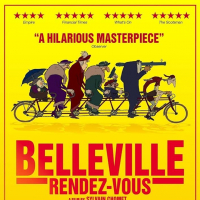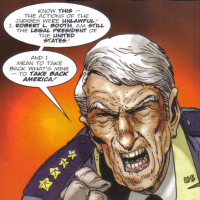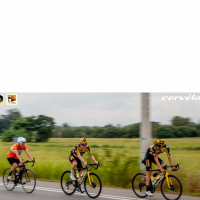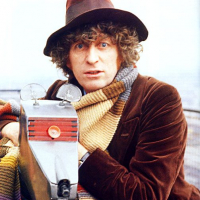TDF 2022:- Stage 4: Dunkerque to Calais, 171.5kms ***Spoilers***

blazing_saddles
Posts: 22,730
in Pro race
Stage 4: Dunkerque to Calais, 171.5kms
Start Time: 13-15CET
Although the stage starts and finishes at sea level, the amount of climbing in between might well give the sprinters some cause for concern. The peloton will, for example, head towards the hills of West Flanders, where riders familiar with the venerable Four Days of Dunkirk stage race will feel right at home, as this 171.5-kilometer loop takes in the infamous Mont Cassel, before visiting the Boulonnais hills. There’s likely to be lots of long-range attacks, especially in the final section along the coast that could well be windy: the climbs near the Cap Gris-Nez and Cap Blanc-Nez headlands could prove decisive.
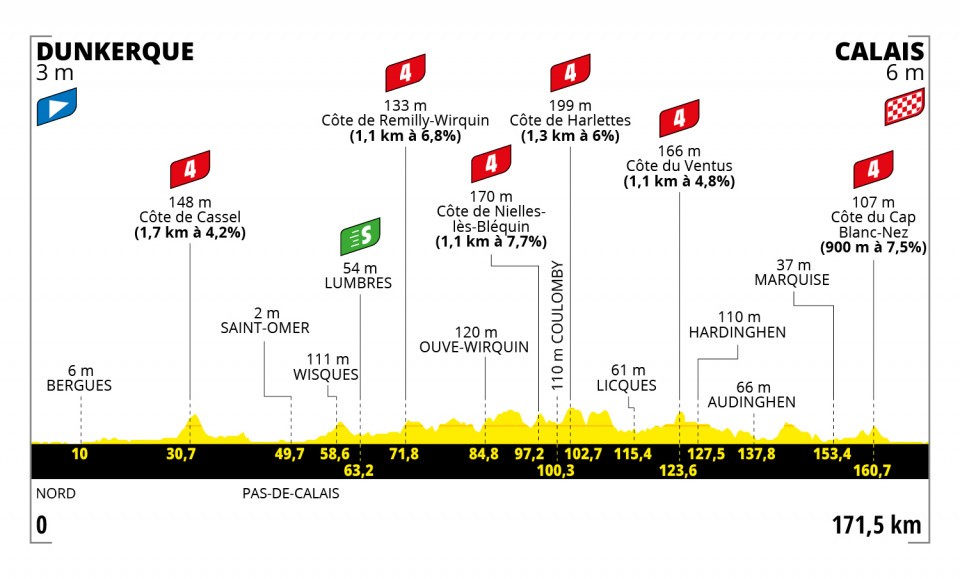
Dunkirk has been a regular host to the Tour de France. The last stage start was in 2007. The race went to Ghent, where Gert Steegmans took the win.
Calais is relatively unexperienced in terms of hosting La Grande Boucle. It’s the third time in the 120-year history of the Tour that the town welcomes the race within its borders.
The route leads mainly through the Parc Naturel Régional des Caps et Marais d’Opale, or The Regional Nature Park of the Opal Capes and Marshes.
With both start and finish coastal towns windy conditions could play a crucial role. Moreover, the route is far from flat, although big climbs are absent. The combination of constant winds and neverending undulations could prove to be decisive.
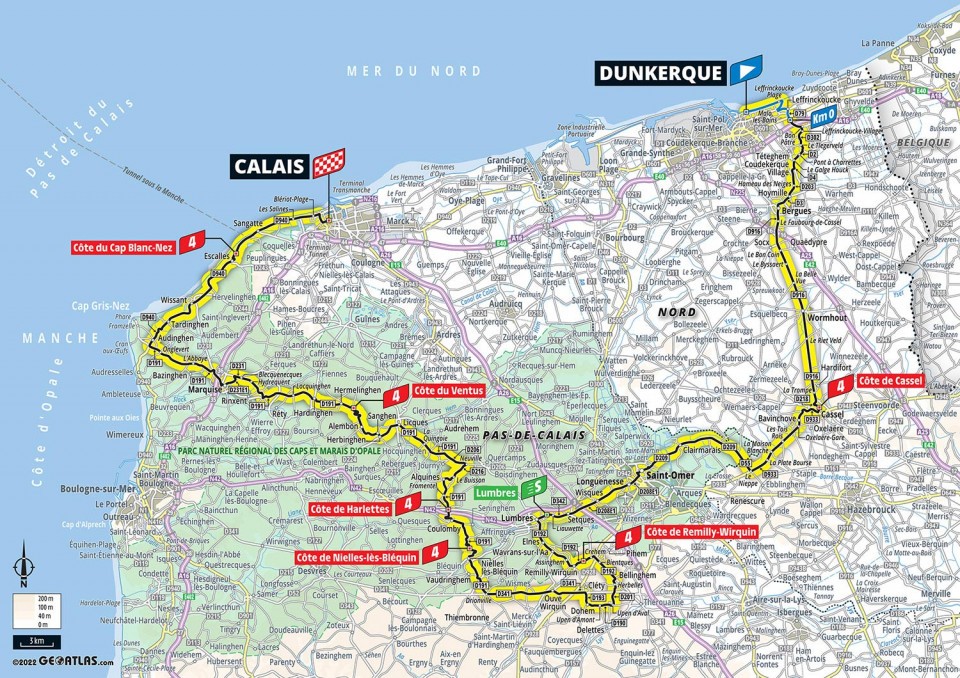
The Climbs:
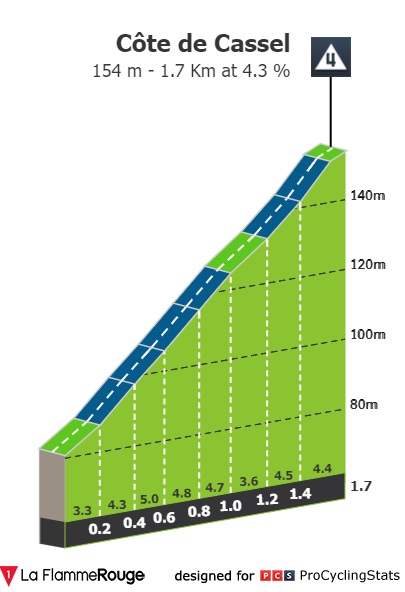
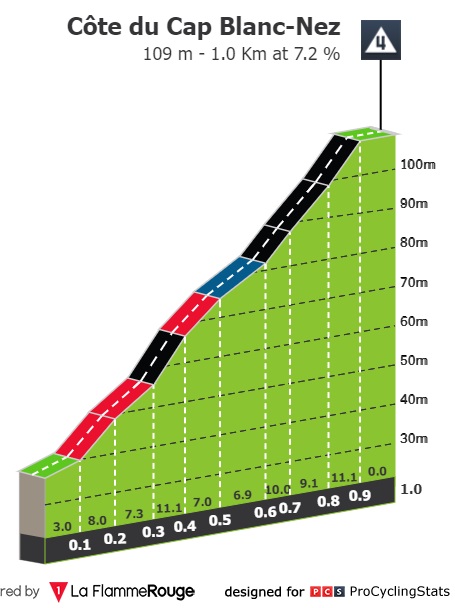
Final Kms.
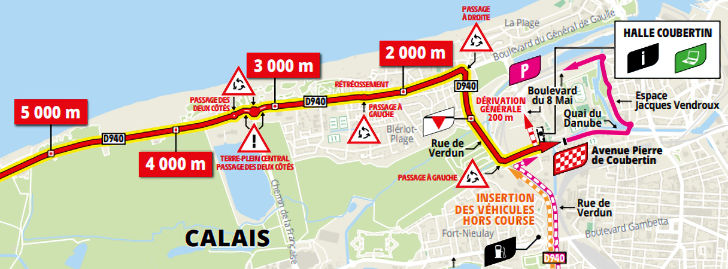
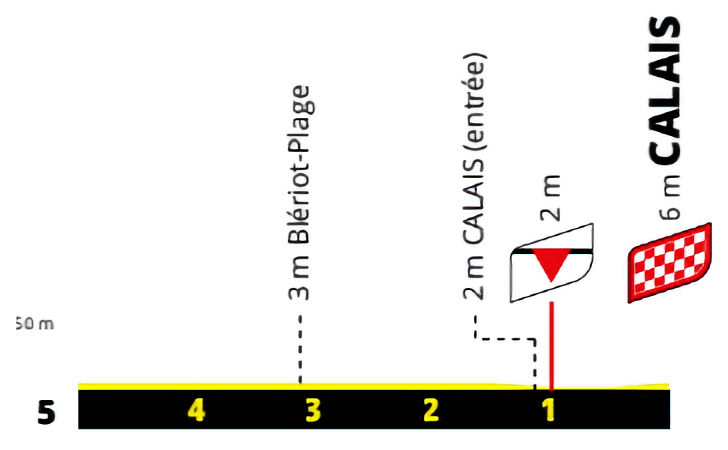
What to Expect.
Depending upon how hard the second half of the stage is race, the wind, the strength of the break etc, the parcours could prove sufficiently tough to weed out the pure sprinters in favour of the types who are still fast after a hard race.
Dunkerque
Population: 86,800
Specialities: potjevleesch (pieces of chicken, pork and veal in jelly), Flemish carbonade (meat simmered in beer), waffles.
The town is famous for two events: The Dunkirk evacuation and the Dunkirk carnival. Since we all know the history of Operation Dynamo, here's a bit about the carnival as it's pretty weird and good for a laugh.
The Dunkirk carnival is one of the major festive events in the North of France. The carnival crowd moves through the streets of the city singing typical tunes, guided by a brass band led by the drum major. The carnival people hold on to each other's elbows and form lines that follow each other through the streets, the so-called "gang". Sometimes, some of them stop for a pilgrimage to the chapels (bistros), where they chug down beer and onion soup. The procession ends on the Grand-Place where the carnival people gather for the rigodon, the final rowdy dance, then sing a tribute to corsair Jean Bart.
As they pass in front of the Town Hall, this compact and colourful mass demands its due: a volley of 450 kilos of cellophane-wrapped salted herring, reminiscent of the imminent departure of the fishermen for Iceland. From the central balcony, the mayor holds up a lobster, presents it to the crowd and throws six of them. Whoever is lucky enough to get hold of a (plastic) lobster can take it back to the town hall where they will be given a voucher for a real one in a fish shop in exchange.
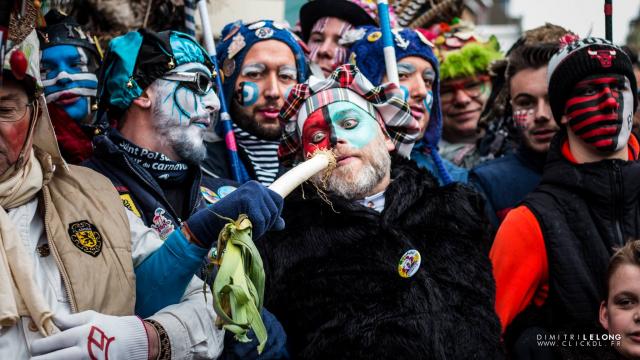
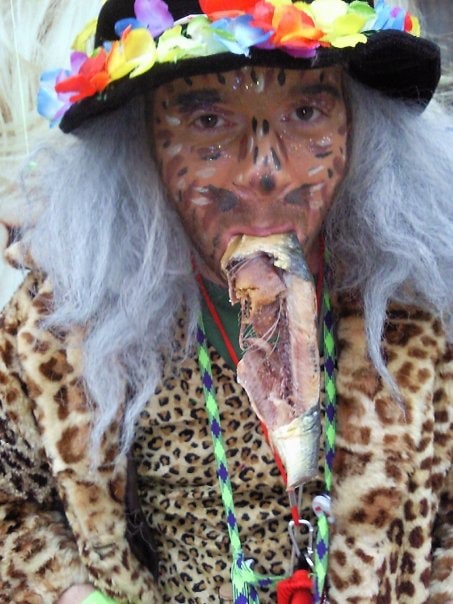
DUNKIRK AND CYCLING
Dunkirk has been on the Tour de France route 19 times. As a hotspot of the race between 1911 and 1927, it saw the triumph of future Tour winners such as François Faber, Firmin Lambot, Ottavio Bottechia or André Leducq. Local rider Félix Goethals made a speciality of winning there, with three victories in 1920, 1921 and 1923. After a hiatus that lasted until 1958, the town hosted the prologue of the Grande Boucle in 2001, won by Christophe Moreau. The last time the race passed through the town, in 2007, it was won by the Belgian Gert Steegmans. Among the riders linked to the town, we must mention Christian Palka, professional from 1971 to 1974 and who became one of the most popular radio journalists in his region. A thought also goes to Raymond Louviot, French champion in 1934 and then talented sports director, who was killed in a road accident in Dunkirk in 1969, on the eve of the Four Days.
Potjevleesch
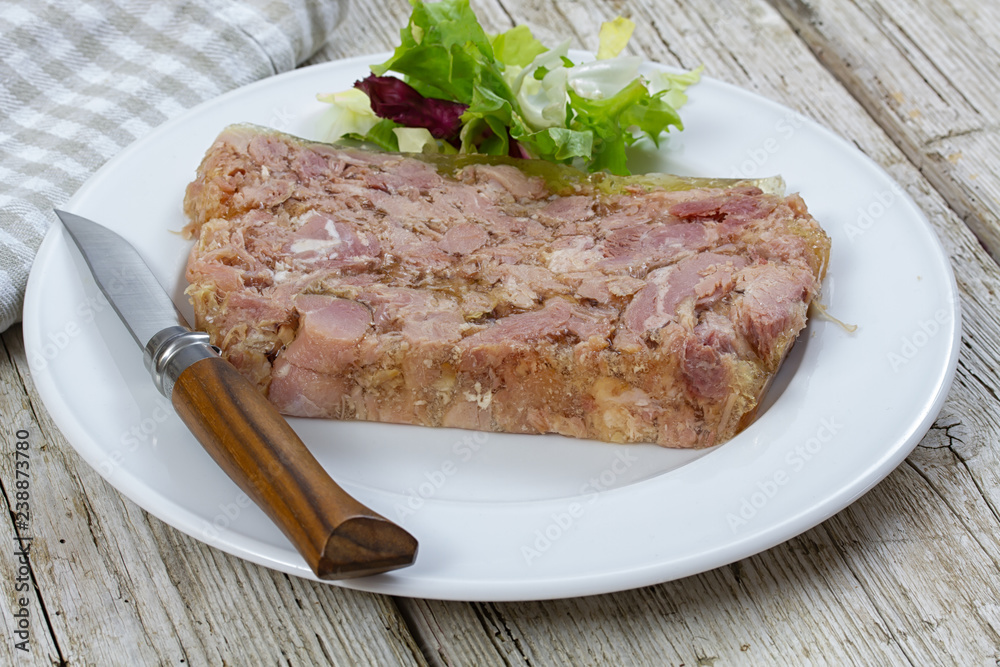
Calais
Population: 76,000
Specialities: welsh (toasted bread topped with beer, ham, cheese and mustard), Dragon and 2 Caps beers, Le Calais (pastry with a coffee and chicory taste)
As the gateway to the British Isles and the point of passage for the English to the continent, Calais enjoys remarkable accessibility thanks to maritime traffic, the Channel Tunnel, two motorways and high-speed rail links to London, Paris and Brussels. This geographical position favours a natural concentration of passengers and goods.
CALAIS AND CYCLING
As a port of entry to the UK, Calais has seen the Tour de France and its followers pass through each time it has visited the UK, but the town has only been a stage town twice before, in 1994 and 2001. The first time, after a Grand Départ in Lille, it was a 66,5 km team time trial that saw the GB-MG Technogym team win and Johan Museeuw take the Yellow Jersey before crossing the Channel for three stages in England. Seven years later, Calais was the starting town for a stage that ended in Antwerp with a winning sprint by Marc Wauters. Several times the finishing town of the Four Days of Dunkirk, Calais was also, in the pioneering days, the destination of two historic road races, Lille-Calais, won in 1895 by Maurice Garin, the future first winner of the Tour, and Paris-Calais, contested between 1909 and 1926 and won for the first time by Eugène Christophe. Second place went to Léon Lannoy from Calais, who took part in the Tour de France in 1909 and 1910. Another local rider, Steven Tronet, was French road champion in 2015.

A "Recette du Welsh"

2 Caps beer
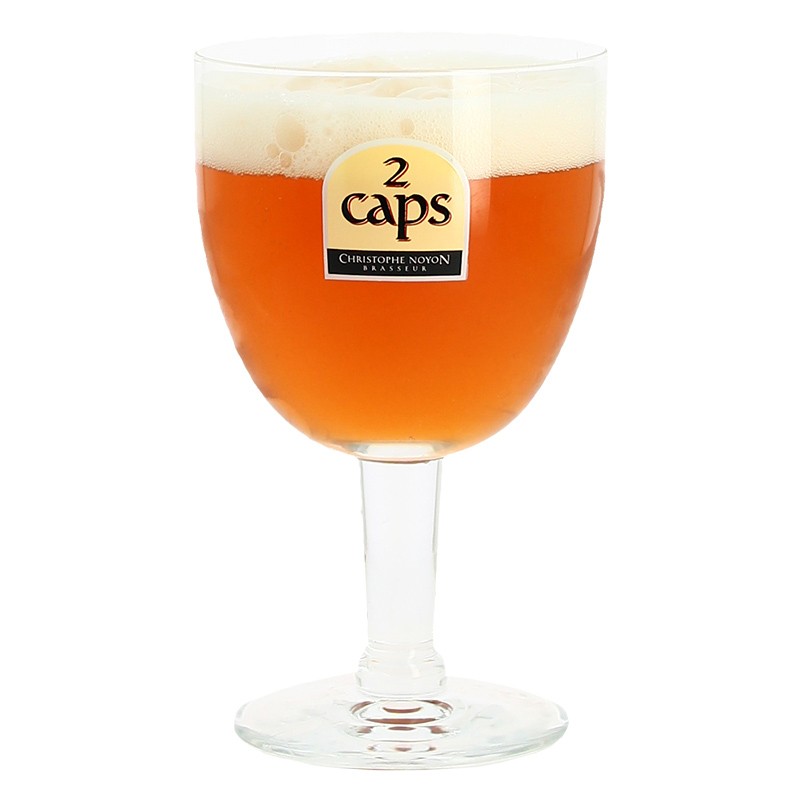
Start Time: 13-15CET
Although the stage starts and finishes at sea level, the amount of climbing in between might well give the sprinters some cause for concern. The peloton will, for example, head towards the hills of West Flanders, where riders familiar with the venerable Four Days of Dunkirk stage race will feel right at home, as this 171.5-kilometer loop takes in the infamous Mont Cassel, before visiting the Boulonnais hills. There’s likely to be lots of long-range attacks, especially in the final section along the coast that could well be windy: the climbs near the Cap Gris-Nez and Cap Blanc-Nez headlands could prove decisive.

Dunkirk has been a regular host to the Tour de France. The last stage start was in 2007. The race went to Ghent, where Gert Steegmans took the win.
Calais is relatively unexperienced in terms of hosting La Grande Boucle. It’s the third time in the 120-year history of the Tour that the town welcomes the race within its borders.
The route leads mainly through the Parc Naturel Régional des Caps et Marais d’Opale, or The Regional Nature Park of the Opal Capes and Marshes.
With both start and finish coastal towns windy conditions could play a crucial role. Moreover, the route is far from flat, although big climbs are absent. The combination of constant winds and neverending undulations could prove to be decisive.

The Climbs:


Final Kms.


What to Expect.
Depending upon how hard the second half of the stage is race, the wind, the strength of the break etc, the parcours could prove sufficiently tough to weed out the pure sprinters in favour of the types who are still fast after a hard race.
Dunkerque
Population: 86,800
Specialities: potjevleesch (pieces of chicken, pork and veal in jelly), Flemish carbonade (meat simmered in beer), waffles.
The town is famous for two events: The Dunkirk evacuation and the Dunkirk carnival. Since we all know the history of Operation Dynamo, here's a bit about the carnival as it's pretty weird and good for a laugh.
The Dunkirk carnival is one of the major festive events in the North of France. The carnival crowd moves through the streets of the city singing typical tunes, guided by a brass band led by the drum major. The carnival people hold on to each other's elbows and form lines that follow each other through the streets, the so-called "gang". Sometimes, some of them stop for a pilgrimage to the chapels (bistros), where they chug down beer and onion soup. The procession ends on the Grand-Place where the carnival people gather for the rigodon, the final rowdy dance, then sing a tribute to corsair Jean Bart.
As they pass in front of the Town Hall, this compact and colourful mass demands its due: a volley of 450 kilos of cellophane-wrapped salted herring, reminiscent of the imminent departure of the fishermen for Iceland. From the central balcony, the mayor holds up a lobster, presents it to the crowd and throws six of them. Whoever is lucky enough to get hold of a (plastic) lobster can take it back to the town hall where they will be given a voucher for a real one in a fish shop in exchange.


DUNKIRK AND CYCLING
Dunkirk has been on the Tour de France route 19 times. As a hotspot of the race between 1911 and 1927, it saw the triumph of future Tour winners such as François Faber, Firmin Lambot, Ottavio Bottechia or André Leducq. Local rider Félix Goethals made a speciality of winning there, with three victories in 1920, 1921 and 1923. After a hiatus that lasted until 1958, the town hosted the prologue of the Grande Boucle in 2001, won by Christophe Moreau. The last time the race passed through the town, in 2007, it was won by the Belgian Gert Steegmans. Among the riders linked to the town, we must mention Christian Palka, professional from 1971 to 1974 and who became one of the most popular radio journalists in his region. A thought also goes to Raymond Louviot, French champion in 1934 and then talented sports director, who was killed in a road accident in Dunkirk in 1969, on the eve of the Four Days.
Potjevleesch

Calais
Population: 76,000
Specialities: welsh (toasted bread topped with beer, ham, cheese and mustard), Dragon and 2 Caps beers, Le Calais (pastry with a coffee and chicory taste)
As the gateway to the British Isles and the point of passage for the English to the continent, Calais enjoys remarkable accessibility thanks to maritime traffic, the Channel Tunnel, two motorways and high-speed rail links to London, Paris and Brussels. This geographical position favours a natural concentration of passengers and goods.
CALAIS AND CYCLING
As a port of entry to the UK, Calais has seen the Tour de France and its followers pass through each time it has visited the UK, but the town has only been a stage town twice before, in 1994 and 2001. The first time, after a Grand Départ in Lille, it was a 66,5 km team time trial that saw the GB-MG Technogym team win and Johan Museeuw take the Yellow Jersey before crossing the Channel for three stages in England. Seven years later, Calais was the starting town for a stage that ended in Antwerp with a winning sprint by Marc Wauters. Several times the finishing town of the Four Days of Dunkirk, Calais was also, in the pioneering days, the destination of two historic road races, Lille-Calais, won in 1895 by Maurice Garin, the future first winner of the Tour, and Paris-Calais, contested between 1909 and 1926 and won for the first time by Eugène Christophe. Second place went to Léon Lannoy from Calais, who took part in the Tour de France in 1909 and 1910. Another local rider, Steven Tronet, was French road champion in 2015.

A "Recette du Welsh"

2 Caps beer

"Science is a tool for cheaters". An anonymous French PE teacher.
1
Comments
-
Chapeau - great write up!'Do not compare your bike to others, for always there will be greater and lesser bikes'0
-
About a third of the autobus will be French, but this will be conveniently forgotten in the need for national myth-making about those perfidious English.RichN95. said:I assume all the British riders will lose time, just make the time cut and proclaim it a great triumph for the next 70 years.
0 -
(nobody's popular version of Dunkirk stands up to much scrutiny, imho - even the German view of it is somewhat confused)0
-
Tough one to call this one. Sprinter-puncheur , puncher-who can sprint
Sagan is hungry!0 -
Lanterne_Rogue said:
(nobody's popular version of Dunkirk stands up to much scrutiny, imho - even the German view of it is somewhat confused)
Christopher Nolan's version is a masterpieceTwitter: @RichN952 -
If in doubt, pick WVA.specialgueststar said:Tough one to call this one. Sprinter-puncheur , puncher-who can sprint
Sagan is hungry!2 -
At km10 they go through Bergues, setting of the film Bienvenue chez les Ch'tis, which I would highly recommend1
-
This at 10km to go makes it a potential humdinger of a last hour.

Or alternatively it could be a day when MvdP goes with 75km to go.
Definitely has a feel of an all day watch, anyway.0 -
Oh poo.
No ITV until 2pm, which is why, I suspect, Kirby is starting up commentary."Science is a tool for cheaters". An anonymous French PE teacher.0 -
Lol wiggo"If I was a 38 year old man, I definitely wouldn't be riding a bright yellow bike with Hello Kitty disc wheels, put it that way. What we're witnessing here is the world's most high profile mid-life crisis" Afx237vi Mon Jul 20, 2009 2:43 pm0
-
 Wiggins thinking that leaving the g off his compliment to van Aert makes it not a swear word 0
Wiggins thinking that leaving the g off his compliment to van Aert makes it not a swear word 0 -
Surprising... Soft break?"If I was a 38 year old man, I definitely wouldn't be riding a bright yellow bike with Hello Kitty disc wheels, put it that way. What we're witnessing here is the world's most high profile mid-life crisis" Afx237vi Mon Jul 20, 2009 2:43 pm0
-
Cort and Perez just slide off the front"If I was a 38 year old man, I definitely wouldn't be riding a bright yellow bike with Hello Kitty disc wheels, put it that way. What we're witnessing here is the world's most high profile mid-life crisis" Afx237vi Mon Jul 20, 2009 2:43 pm0
-
So Magnus Cort gets a single breakaway companion.
This Tour’s battle for break makes the Giros look frenetic"Science is a tool for cheaters". An anonymous French PE teacher.0 -
This means there's gonna be a 70km MvdP rampage, right?
RIGHT?!?!?0 -
I think commentary can wait till 2blazing_saddles said:Oh poo.
No ITV until 2pm, which is why, I suspect, Kirby is starting up commentary.0 -
Eurosport have finally nailed the commentary pairing for when nothing is happening. Jonathan Harris Bass and Carlton Kirby.kingstongraham said:
I think commentary can wait till 2blazing_saddles said:Oh poo.
No ITV until 2pm, which is why, I suspect, Kirby is starting up commentary.
They have talked so much about roadside trivia that Sean Kelly could have taken a siesta.
"Science is a tool for cheaters". An anonymous French PE teacher.0 -
What's happened to the six man break? I mean that is a thing. Right?0
-
I'm amazed that all three road stages so far have resulted in the first riders to try rolling off the front with no counter attacks. You usually at least have the French teams fighting to have the right spread of cannon fodder in the move. Very odd, possibly a reflection of the short leash breakaways are given in top stage races these days0
-
Why are QS riding?0
-
Proper cobbles"If I was a 38 year old man, I definitely wouldn't be riding a bright yellow bike with Hello Kitty disc wheels, put it that way. What we're witnessing here is the world's most high profile mid-life crisis" Afx237vi Mon Jul 20, 2009 2:43 pm0
-
Ridiculously long sprint for one point in the KoM.0
-
That point guarantees the jersey for Cort tomorrow and Thursday.0
-
Would have Cav stood a chance at winning this stage?0
-
Splits? Looks like there's some wind about, from the flags. QS drilling it.0
-
Man the klaxon!Warning No formatter is installed for the format0
-
Seems it was more to make everyone's life a misery for the rest of the day and generally cause chaos.DeadCalm said:1
